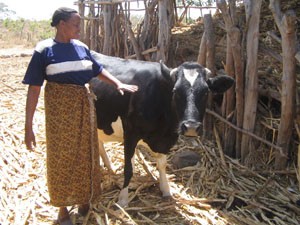
Luki Muia of Machakos, Kenya, used to keep eight cows that gave barely enough milk for her and her five children, with no surplus to sell. Now, she says efforts by a USAID public-private partnership have given her a clear road map out of the poverty that had always been part of her life. She grows bananas, has learned mango grafting, and was chosen to receive an improved breed of cow.
Her new skills coupled with her experience as a farmer have brought Luki and her family enough milk for consumption and sale. Their newfound income from selling dairy and fruit has meant better nutrition, access to quality education, money for school uniforms and health care, and even chain-link fencing to protect her fruit trees from animal damage. She also has been able to welcome five needy children into her family and support them with food, clothing, shelter, education, and love.
American farmers are helping fellow farmers in areas like Machakos to produce their own food. In Machakos, people have long subsisted on less than $1 a day from logging, charcoal production, woodcarving and sand harvesting. Environmental degradation from these activities, coupled with increasing water scarcity, threatened to collapse the already fragile livelihoods of the villagers.
Through “growing projects”, farmers in the United States produce a crop or other commodity, market it, and make the funds available to equip overseas farmers with seeds, tools and training to overcome often harsh climatic and economic realities and get the community back on its feet.
With their time no longer consumed with basic survival, Kenyan farmers now have the energy to improve the quality of life for themselves and others in their community. Equipped with the tools, training and experience they need, they feel empowered for having accomplished so much on their own. No longer dependent on others for survival, they are well on their way toward becoming self-sustaining.







Comment
Make a general inquiry or suggest an improvement.